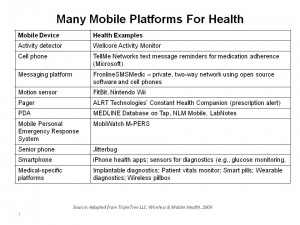 Capitol Hill is keen to know more about telehealth and health care information technology. Today, I am participating in a roundtable discussion on mobile health as part of an event hosted by Qualcomm and the American Telemedicine Association.
Capitol Hill is keen to know more about telehealth and health care information technology. Today, I am participating in a roundtable discussion on mobile health as part of an event hosted by Qualcomm and the American Telemedicine Association.
Why “mHealth” anyway? It’s because we’re a mobile society. As B.J. Fogg, the director of the Stanford Persuasive Technology Lab, wrote, “We don’t merely adopt cell phones; we marry them.” In our 24×7 lives, we’re project managing our entertainment, financial management, travel services, and shopping via mobile devices. Engaged health consumers ask, “why can’t I ‘DIY’ my health the way I manage other aspects of my life?”
Thus, 8 in 10 Americans are interested in mobile health, according to a Harris/CTIA survey conducted in Oct 2009. 7 in 10 see mHealth’s role in homebased care, and 6 in 10 like mHealth’s prospects for home monitoring, enhancing health security and safety for oneself and one’s family. 5 in 10 Americans think mHealth can improve access to care, according to Harris/CTIA.
Health citizens view certain kinds of mHealth services are especially attractive. Mobile exams, wellness, monitoring (for self and elders), and medication reminders are the top-ranked services among American adults, based on a poll by PricewaterhouseCoopers.
Health Populi’s Hot Points: See last Sunday’s New York Times magazine cover story, The Data-Driven Life, on knowing your numbers in hyper-drive to understand the bleeding edge of mHealth. This is an extreme picture that paints the present for a few people, and the future for many of us who want to do full-on health engagement.
The more engaged we are with our own health, the healthier we can become. Knowing one’s numbers, from blood pressure and glucose to simply knowing the number of steps we take daily brings awareness of our health and wellbeing. Knowing numbers empowers people to make micro-decisions and changes each day that bolster health and keep illness at bay.
Think: Health as lifestyle. mHealth, through a variety of platforms shown in the table above, can help people get healthy, stay healthy and, when sick, care for oneself and loved ones at home and on-the-go. Think: mHealth as personal health reform.




 Interviewed live on BNN Bloomberg (Canada) on the market for GLP-1 drugs for weight loss and their impact on both the health care system and consumer goods and services -- notably, food, nutrition, retail health, gyms, and other sectors.
Interviewed live on BNN Bloomberg (Canada) on the market for GLP-1 drugs for weight loss and their impact on both the health care system and consumer goods and services -- notably, food, nutrition, retail health, gyms, and other sectors. Thank you, Feedspot, for
Thank you, Feedspot, for  As you may know, I have been splitting work- and living-time between the U.S. and the E.U., most recently living in and working from Brussels. In the month of September 2024, I'll be splitting time between London and other parts of the U.K., and Italy where I'll be working with clients on consumer health, self-care and home care focused on food-as-medicine, digital health, business and scenario planning for the future...
As you may know, I have been splitting work- and living-time between the U.S. and the E.U., most recently living in and working from Brussels. In the month of September 2024, I'll be splitting time between London and other parts of the U.K., and Italy where I'll be working with clients on consumer health, self-care and home care focused on food-as-medicine, digital health, business and scenario planning for the future...